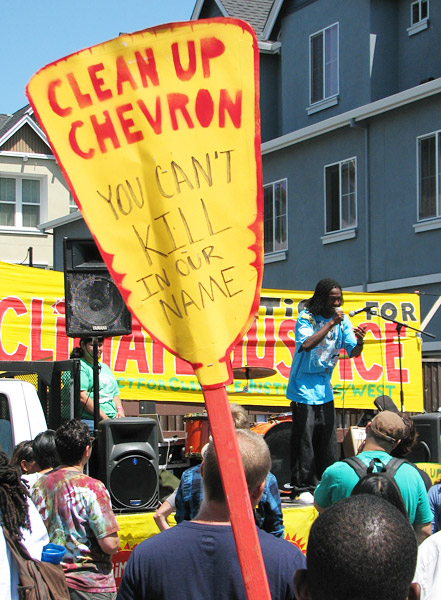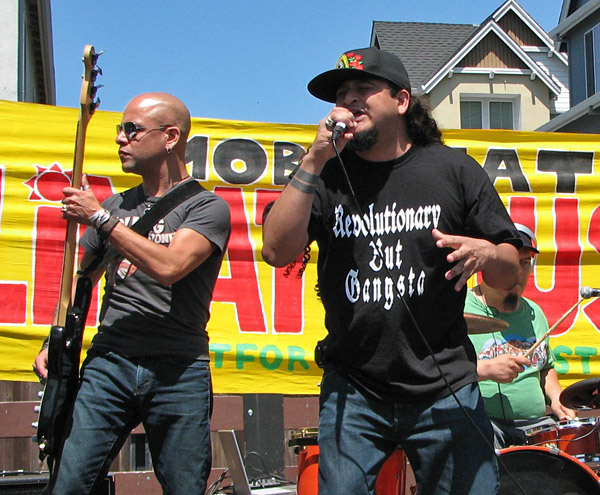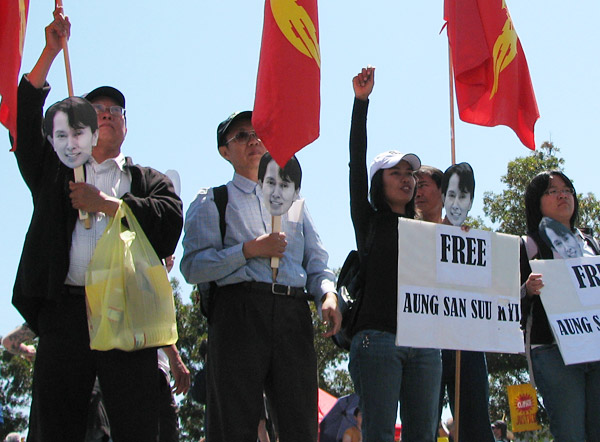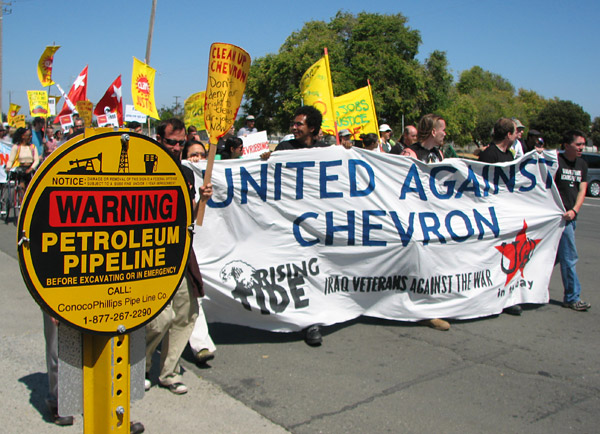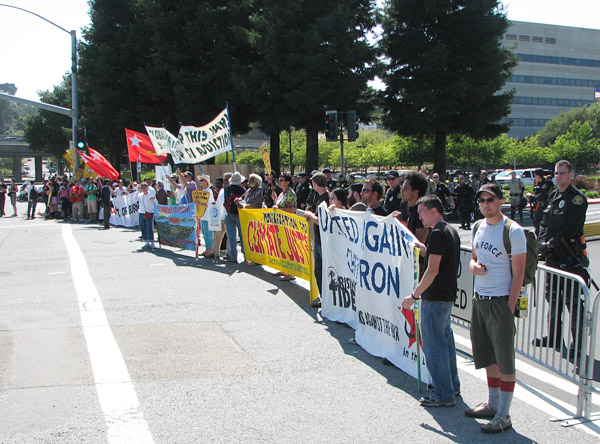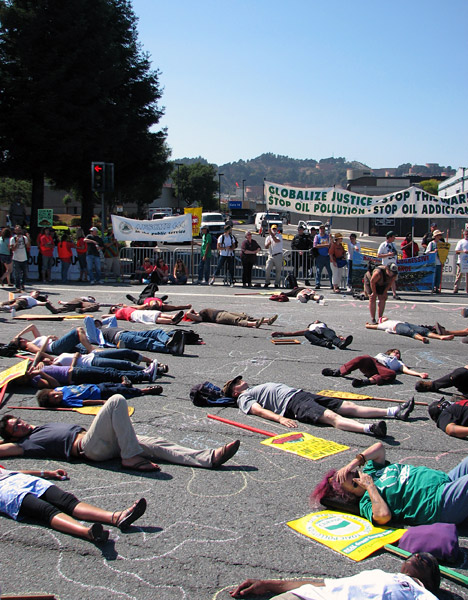From the Open-Publishing Calendar
From the Open-Publishing Newswire
Indybay Feature
Hundreds protest Chevron in Richmond
Anti-war groups joined the demonstration today in Richmond, California because Chevron is directly responsible for the war in Iraq. From the era of the Saddam Hussein dictatorship, Chevron has worked diligently to gain access to Iraqi oil.
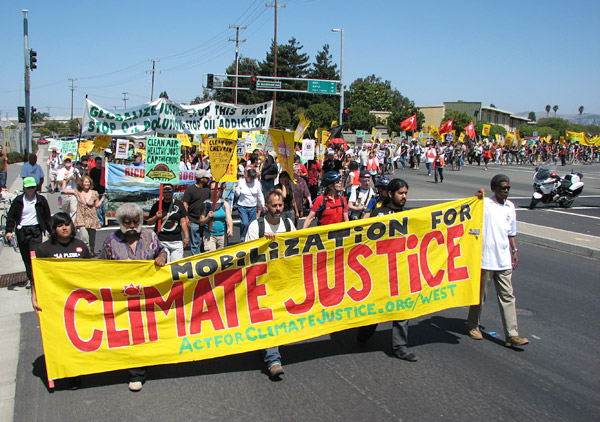
On August 15th, 2009 activists and community members from around the Bay Area joined Richmond, California residents to protest the Chevron corporation’s devastating environmental and human rights record around the world. They work with a coalition of dozens of social justice and environmental organizations, called the Mobilization for Climate Justice, to highlight and stop Chevron’s legacy of criminality. From faulty environmental impact reports for a dirty crude expansion and ongoing pollution in Richmond, to using the Nigerian military to murder environmental activists in the Niger Delta, to toxic waste sites and subsequent harm to human health (that dwarfs the Exxon-Valdez spill) in the Ecuadorian Amazon, Chevron is responsible for a substantial roster of injured people and denuded environments throughout the globe. Not the least of which are the lands and people of Iraq. -From the "Why we protest Chevron" statement by anti-war groups.
For more information:
http://west.actforclimatejustice.org/
Add Your Comments
Comments
(Hide Comments)
Great action photos!
By Antonia Juhasz (Global Exchange) and Cathy Kunkel (Rising Tide)
Averting Climate Crisis
The scientific consensus is that, in order to avert the most dangerous possible outcomes of climate change, global emissions of heat-trapping greenhouse gases must peak and decline before 2020. Our actions globally over the next few years are therefore critical. The Kyoto Protocol, negotiated in 1997, aimed to reduce greenhouse gas emissions from developed countries 5% below 1990 levels by 2012. Due to industry opposition and lack of buy-in from key governments, especially the United States, this goal will not be met.
Copenhagen: December 2009
This December, in Copenhagen, governments will negotiate for a treaty to govern emissions reductions post-2012. These negotiations are critical for ensuring that we get on a path where global emissions peak and then decline over the next decade. But corporations, particularly the oil companies, are working to turn the negotiations in their favor, by watering down targets and promoting carbon offsets, which allow companies to shirk their responsibility to reduce their own emissions. Last year’s international climate negotiations in Poznan, Poland drew at least 1500 corporate lobbyists.
Corporations Weigh-In
Corporations have also worked hard to weaken domestic U.S. policy, including the Waxman-Markey American Clean Energy and Security Act, recently passed by the House. An estimated 2,340 lobbyists from more than 770 companies and interest groups worked to influence federal climate policy in the past year – more than four climate lobbyists for every member of Congress. In the first 3 months of 2009, the oil and gas industry spent $44.5 million on lobbying, up nearly 50% over the first quarter of 2008, to influence domestic policy, including climate policy. The Center for American Progress found that members of the House Energy and Commerce Committee who voted against the Waxman-Markey bill received on average almost 3 times as much money in contributions from carbon-intensive industries than members who voted in favor of the legislation.
If the U.S. does not go to Copenhagen with a domestic policy that promises meaningful emissions reductions over the next decade, it will be all but impossible to get other nations to agree to the necessary emissions cuts.
Oil Drives Climate Change – Chevron Drives Oil
In the United States, petroleum accounts for more than 40 % of total CO2 emissions from fossil fuel combustion (the burning of fuels, including coal, oil, and natural gas to produce energy and to power vehicles) – more than any other fuel.
Chevron is among the world’s largest corporate contributors to climate change. It is the largest corporation in California, the 3rd largest U.S. corporation, the 4th largest oil company in the world, and the 5th largest corporation in the world. Chevron was a member of the Global Climate Coalition that led an aggressive lobbying and public relations campaign throughout the 1990s and until 2002 against the idea that emissions of heat-trapping gases could lead to global warming. Chevron remains an active lobbyist against meaningful climate change legislation and for stymieing meaningful change in Copenhagen.
Chevron’s Alternative Energy Lies & Expansion Into Climate Crushing Production
Chevron tries to market itself as an “alternative energy” company that is “part of the solution” to our climate crisis. All the while, however, Chevron spent, at best, less than 3% of its total capital and exploratory expenditures on clean alternative energy in 2008.
Rather, Chevron is aggressively expanding into increasingly environmentally and climate destructive methods of oil production. Chevron is a leader in oil production from the Alberta tar sands—an energy-intensive process that generates three to five times more global warming pollution than conventional oil production. Similarly, Chevron is a leader in developing oil from shale in the Midwestern U.S.—a process causing significantly greater emissions of global warming pollution than conventional production. There is even talk of building coal-fired power plants to provide the energy to sustain oil shale production. Chevron is a leader in deep offshore drilling. Drilling in water depths greater than 500 feet releases methane, a green house gas at least twenty times more potent than carbon dioxide in its contribution to global warming. Chevron also operates a Coal Company—the most carbon-intensive fossil fuel—and a Chemical Company producing a host of toxic and environmentally destructive chemicals.
The Future: Heavier More Climate Destructive Oil
In 2008, Chevron gave a presentation at the “JPMorgan Annual Energy Symposium: Heavy Oil,” entitled “Chevron: a Focused Leader in Heavy Oil” detailing how the company is “positioning ourselves as a leader” in heavy oil and moving aggressively into oil producing areas that yield heavier slates of crude. In Chevron’s 2007 SEC tax filing, the company describes its plan for increasing its capacity to process heavier crude oil at its Richmond refinery.
In an exhaustive study, Richmond’s Communities for a Better Environment found that a switch to heavy oil or tar sands could double or triple greenhouse gas emissions from U.S. oil refineries and concluded that, for climate protection, refineries should “cap the crude” and be prohibited from refining heavier oil.
What You Can Do!
Join the Mobilization for Climate Justice!
Learn more at http://actforclimatejustice.org/west
Averting Climate Crisis
The scientific consensus is that, in order to avert the most dangerous possible outcomes of climate change, global emissions of heat-trapping greenhouse gases must peak and decline before 2020. Our actions globally over the next few years are therefore critical. The Kyoto Protocol, negotiated in 1997, aimed to reduce greenhouse gas emissions from developed countries 5% below 1990 levels by 2012. Due to industry opposition and lack of buy-in from key governments, especially the United States, this goal will not be met.
Copenhagen: December 2009
This December, in Copenhagen, governments will negotiate for a treaty to govern emissions reductions post-2012. These negotiations are critical for ensuring that we get on a path where global emissions peak and then decline over the next decade. But corporations, particularly the oil companies, are working to turn the negotiations in their favor, by watering down targets and promoting carbon offsets, which allow companies to shirk their responsibility to reduce their own emissions. Last year’s international climate negotiations in Poznan, Poland drew at least 1500 corporate lobbyists.
Corporations Weigh-In
Corporations have also worked hard to weaken domestic U.S. policy, including the Waxman-Markey American Clean Energy and Security Act, recently passed by the House. An estimated 2,340 lobbyists from more than 770 companies and interest groups worked to influence federal climate policy in the past year – more than four climate lobbyists for every member of Congress. In the first 3 months of 2009, the oil and gas industry spent $44.5 million on lobbying, up nearly 50% over the first quarter of 2008, to influence domestic policy, including climate policy. The Center for American Progress found that members of the House Energy and Commerce Committee who voted against the Waxman-Markey bill received on average almost 3 times as much money in contributions from carbon-intensive industries than members who voted in favor of the legislation.
If the U.S. does not go to Copenhagen with a domestic policy that promises meaningful emissions reductions over the next decade, it will be all but impossible to get other nations to agree to the necessary emissions cuts.
Oil Drives Climate Change – Chevron Drives Oil
In the United States, petroleum accounts for more than 40 % of total CO2 emissions from fossil fuel combustion (the burning of fuels, including coal, oil, and natural gas to produce energy and to power vehicles) – more than any other fuel.
Chevron is among the world’s largest corporate contributors to climate change. It is the largest corporation in California, the 3rd largest U.S. corporation, the 4th largest oil company in the world, and the 5th largest corporation in the world. Chevron was a member of the Global Climate Coalition that led an aggressive lobbying and public relations campaign throughout the 1990s and until 2002 against the idea that emissions of heat-trapping gases could lead to global warming. Chevron remains an active lobbyist against meaningful climate change legislation and for stymieing meaningful change in Copenhagen.
Chevron’s Alternative Energy Lies & Expansion Into Climate Crushing Production
Chevron tries to market itself as an “alternative energy” company that is “part of the solution” to our climate crisis. All the while, however, Chevron spent, at best, less than 3% of its total capital and exploratory expenditures on clean alternative energy in 2008.
Rather, Chevron is aggressively expanding into increasingly environmentally and climate destructive methods of oil production. Chevron is a leader in oil production from the Alberta tar sands—an energy-intensive process that generates three to five times more global warming pollution than conventional oil production. Similarly, Chevron is a leader in developing oil from shale in the Midwestern U.S.—a process causing significantly greater emissions of global warming pollution than conventional production. There is even talk of building coal-fired power plants to provide the energy to sustain oil shale production. Chevron is a leader in deep offshore drilling. Drilling in water depths greater than 500 feet releases methane, a green house gas at least twenty times more potent than carbon dioxide in its contribution to global warming. Chevron also operates a Coal Company—the most carbon-intensive fossil fuel—and a Chemical Company producing a host of toxic and environmentally destructive chemicals.
The Future: Heavier More Climate Destructive Oil
In 2008, Chevron gave a presentation at the “JPMorgan Annual Energy Symposium: Heavy Oil,” entitled “Chevron: a Focused Leader in Heavy Oil” detailing how the company is “positioning ourselves as a leader” in heavy oil and moving aggressively into oil producing areas that yield heavier slates of crude. In Chevron’s 2007 SEC tax filing, the company describes its plan for increasing its capacity to process heavier crude oil at its Richmond refinery.
In an exhaustive study, Richmond’s Communities for a Better Environment found that a switch to heavy oil or tar sands could double or triple greenhouse gas emissions from U.S. oil refineries and concluded that, for climate protection, refineries should “cap the crude” and be prohibited from refining heavier oil.
What You Can Do!
Join the Mobilization for Climate Justice!
Learn more at http://actforclimatejustice.org/west
For more information:
http://actforclimatejustice.org/wes
Can anyone post Antonio's speech at Chevron gate? Audio-- as her expression is integral to the power of the speech.
Thanks!
Thanks!
Hey, not that these are not lovely actions and lovely, good, well meaning people but aren't these actions getting to be a bit formulaic? A die in? The same large puppets we've seen for 10 years? Consistently decreasing numbers and questionable results (aside from good feelings) lead me to ask if this has not just become part of the larger society and power structures, a pressure vent for the capitalist system rather than a challenge to it.
Hey Joe,
If check beyond the photos you will find:
* Richmond environmental justice groups have given one of the most significant challenges to the capitalist system in recent bay Area History by stopping o key piece of big oil's plan to refine a new heavier generation of dirty crude which would result in many time the amount of toxins in the air we breather and 2-3 time more greenhouse gasses, while we need to drastically reduce or puppets, jaded leftists, good intentioned folks will be dieing-in for real.
* These groups are under serious attack from Chevron, dropping millions and major pr and counter organizing campaign to fight back. This demo was a way of showing support for the three groups who are taking on the fifth biggest corproation in the world based right here. Taking them on locally is perhaps one of the most clear handles on the capitalist system. we have in the Bay.
* Climate is the central space of struggles between capital and people and the earth. The market solutions of the polluters are a trojan horse to expand thier power and create a new speculative market. The major driving force is US corporations and thier government. The most valuable thing we can do to oppose it is visible resistance inside the US, as it was ten years ago with the WTO.
* Almost every culture has puppets and many use then for political expression. The groups using this one is Teatro Familias Unidas from Somos Mayfair, and organization of immigrant community members from San Jose. Other performances included hip hop, spoken word, All Nation Drummers, etc. None are new forms and drumming is quite old, but they are good ways to communicate and motivate.
While it is good to develop new and creative forms and we need to push ourselves to do so, we sometimes fall into being activist consumers looking for the latest issue, rad framework or tactic (or say use the old radical formulaic argument that anything that does not meet our revolutionary criteria is just letting off steam for capitalism) and avoid engaging in the long term campaigns that every sucessfull social movement has waged-- yes, even with some repeated tactics and cultural forms.
Below is a little more background:
Chevron, Climate Change, and the Road to Copenhagen 2009
By Antonia Juhasz (Global Exchange) and Cathy Kunkel (Rising Tide)
Averting Climate Crisis
The scientific consensus is that, in order to avert the most dangerous possible outcomes of climate change, global emissions of heat-trapping greenhouse gases must peak and decline before 2020. Our actions globally over the next few years are therefore critical. The Kyoto Protocol, negotiated in 1997, aimed to reduce greenhouse gas emissions from developed countries 5% below 1990 levels by 2012. Due to industry opposition and lack of buy-in from key governments, especially the United States, this goal will not be met.
Copenhagen: December 2009
This December, in Copenhagen, governments will negotiate for a treaty to govern emissions reductions post-2012. These negotiations are critical for ensuring that we get on a path where global emissions peak and then decline over the next decade. But corporations, particularly the oil companies, are working to turn the negotiations in their favor, by watering down targets and promoting carbon offsets, which allow companies to shirk their responsibility to reduce their own emissions. Last year’s international climate negotiations in Poznan, Poland drew at least 1500 corporate lobbyists.
Corporations Weigh-In
Corporations have also worked hard to weaken domestic U.S. policy, including the Waxman-Markey American Clean Energy and Security Act, recently passed by the House. An estimated 2,340 lobbyists from more than 770 companies and interest groups worked to influence federal climate policy in the past year – more than four climate lobbyists for every member of Congress. In the first 3 months of 2009, the oil and gas industry spent $44.5 million on lobbying, up nearly 50% over the first quarter of 2008, to influence domestic policy, including climate policy. The Center for American Progress found that members of the House Energy and Commerce Committee who voted against the Waxman-Markey bill received on average almost 3 times as much money in contributions from carbon-intensive industries than members who voted in favor of the legislation.
If the U.S. does not go to Copenhagen with a domestic policy that promises meaningful emissions reductions over the next decade, it will be all but impossible to get other nations to agree to the necessary emissions cuts.
Oil Drives Climate Change – Chevron Drives Oil
In the United States, petroleum accounts for more than 40 % of total CO2 emissions from fossil fuel combustion (the burning of fuels, including coal, oil, and natural gas to produce energy and to power vehicles) – more than any other fuel.
Chevron is among the world’s largest corporate contributors to climate change. It is the largest corporation in California, the 3rd largest U.S. corporation, the 4th largest oil company in the world, and the 5th largest corporation in the world. Chevron was a member of the Global Climate Coalition that led an aggressive lobbying and public relations campaign throughout the 1990s and until 2002 against the idea that emissions of heat-trapping gases could lead to global warming. Chevron remains an active lobbyist against meaningful climate change legislation and for stymieing meaningful change in Copenhagen.
Chevron’s Alternative Energy Lies & Expansion Into Climate Crushing Production
Chevron tries to market itself as an “alternative energy” company that is “part of the solution” to our climate crisis. All the while, however, Chevron spent, at best, less than 3% of its total capital and exploratory expenditures on clean alternative energy in 2008.
Rather, Chevron is aggressively expanding into increasingly environmentally and climate destructive methods of oil production. Chevron is a leader in oil production from the Alberta tar sands—an energy-intensive process that generates three to five times more global warming pollution than conventional oil production. Similarly, Chevron is a leader in developing oil from shale in the Midwestern U.S.—a process causing significantly greater emissions of global warming pollution than conventional production. There is even talk of building coal-fired power plants to provide the energy to sustain oil shale production. Chevron is a leader in deep offshore drilling. Drilling in water depths greater than 500 feet releases methane, a green house gas at least twenty times more potent than carbon dioxide in its contribution to global warming. Chevron also operates a Coal Company—the most carbon-intensive fossil fuel—and a Chemical Company producing a host of toxic and environmentally destructive chemicals.
The Future: Heavier More Climate Destructive Oil
In 2008, Chevron gave a presentation at the “JPMorgan Annual Energy Symposium: Heavy Oil,” entitled “Chevron: a Focused Leader in Heavy Oil” detailing how the company is “positioning ourselves as a leader” in heavy oil and moving aggressively into oil producing areas that yield heavier slates of crude. In Chevron’s 2007 SEC tax filing, the company describes its plan for increasing its capacity to process heavier crude oil at its Richmond refinery.
In an exhaustive study, Richmond’s Communities for a Better Environment found that a switch to heavy oil or tar sands could double or triple greenhouse gas emissions from U.S. oil refineries and concluded that, for climate protection, refineries should “cap the crude” and be prohibited from refining heavier oil.
If check beyond the photos you will find:
* Richmond environmental justice groups have given one of the most significant challenges to the capitalist system in recent bay Area History by stopping o key piece of big oil's plan to refine a new heavier generation of dirty crude which would result in many time the amount of toxins in the air we breather and 2-3 time more greenhouse gasses, while we need to drastically reduce or puppets, jaded leftists, good intentioned folks will be dieing-in for real.
* These groups are under serious attack from Chevron, dropping millions and major pr and counter organizing campaign to fight back. This demo was a way of showing support for the three groups who are taking on the fifth biggest corproation in the world based right here. Taking them on locally is perhaps one of the most clear handles on the capitalist system. we have in the Bay.
* Climate is the central space of struggles between capital and people and the earth. The market solutions of the polluters are a trojan horse to expand thier power and create a new speculative market. The major driving force is US corporations and thier government. The most valuable thing we can do to oppose it is visible resistance inside the US, as it was ten years ago with the WTO.
* Almost every culture has puppets and many use then for political expression. The groups using this one is Teatro Familias Unidas from Somos Mayfair, and organization of immigrant community members from San Jose. Other performances included hip hop, spoken word, All Nation Drummers, etc. None are new forms and drumming is quite old, but they are good ways to communicate and motivate.
While it is good to develop new and creative forms and we need to push ourselves to do so, we sometimes fall into being activist consumers looking for the latest issue, rad framework or tactic (or say use the old radical formulaic argument that anything that does not meet our revolutionary criteria is just letting off steam for capitalism) and avoid engaging in the long term campaigns that every sucessfull social movement has waged-- yes, even with some repeated tactics and cultural forms.
Below is a little more background:
Chevron, Climate Change, and the Road to Copenhagen 2009
By Antonia Juhasz (Global Exchange) and Cathy Kunkel (Rising Tide)
Averting Climate Crisis
The scientific consensus is that, in order to avert the most dangerous possible outcomes of climate change, global emissions of heat-trapping greenhouse gases must peak and decline before 2020. Our actions globally over the next few years are therefore critical. The Kyoto Protocol, negotiated in 1997, aimed to reduce greenhouse gas emissions from developed countries 5% below 1990 levels by 2012. Due to industry opposition and lack of buy-in from key governments, especially the United States, this goal will not be met.
Copenhagen: December 2009
This December, in Copenhagen, governments will negotiate for a treaty to govern emissions reductions post-2012. These negotiations are critical for ensuring that we get on a path where global emissions peak and then decline over the next decade. But corporations, particularly the oil companies, are working to turn the negotiations in their favor, by watering down targets and promoting carbon offsets, which allow companies to shirk their responsibility to reduce their own emissions. Last year’s international climate negotiations in Poznan, Poland drew at least 1500 corporate lobbyists.
Corporations Weigh-In
Corporations have also worked hard to weaken domestic U.S. policy, including the Waxman-Markey American Clean Energy and Security Act, recently passed by the House. An estimated 2,340 lobbyists from more than 770 companies and interest groups worked to influence federal climate policy in the past year – more than four climate lobbyists for every member of Congress. In the first 3 months of 2009, the oil and gas industry spent $44.5 million on lobbying, up nearly 50% over the first quarter of 2008, to influence domestic policy, including climate policy. The Center for American Progress found that members of the House Energy and Commerce Committee who voted against the Waxman-Markey bill received on average almost 3 times as much money in contributions from carbon-intensive industries than members who voted in favor of the legislation.
If the U.S. does not go to Copenhagen with a domestic policy that promises meaningful emissions reductions over the next decade, it will be all but impossible to get other nations to agree to the necessary emissions cuts.
Oil Drives Climate Change – Chevron Drives Oil
In the United States, petroleum accounts for more than 40 % of total CO2 emissions from fossil fuel combustion (the burning of fuels, including coal, oil, and natural gas to produce energy and to power vehicles) – more than any other fuel.
Chevron is among the world’s largest corporate contributors to climate change. It is the largest corporation in California, the 3rd largest U.S. corporation, the 4th largest oil company in the world, and the 5th largest corporation in the world. Chevron was a member of the Global Climate Coalition that led an aggressive lobbying and public relations campaign throughout the 1990s and until 2002 against the idea that emissions of heat-trapping gases could lead to global warming. Chevron remains an active lobbyist against meaningful climate change legislation and for stymieing meaningful change in Copenhagen.
Chevron’s Alternative Energy Lies & Expansion Into Climate Crushing Production
Chevron tries to market itself as an “alternative energy” company that is “part of the solution” to our climate crisis. All the while, however, Chevron spent, at best, less than 3% of its total capital and exploratory expenditures on clean alternative energy in 2008.
Rather, Chevron is aggressively expanding into increasingly environmentally and climate destructive methods of oil production. Chevron is a leader in oil production from the Alberta tar sands—an energy-intensive process that generates three to five times more global warming pollution than conventional oil production. Similarly, Chevron is a leader in developing oil from shale in the Midwestern U.S.—a process causing significantly greater emissions of global warming pollution than conventional production. There is even talk of building coal-fired power plants to provide the energy to sustain oil shale production. Chevron is a leader in deep offshore drilling. Drilling in water depths greater than 500 feet releases methane, a green house gas at least twenty times more potent than carbon dioxide in its contribution to global warming. Chevron also operates a Coal Company—the most carbon-intensive fossil fuel—and a Chemical Company producing a host of toxic and environmentally destructive chemicals.
The Future: Heavier More Climate Destructive Oil
In 2008, Chevron gave a presentation at the “JPMorgan Annual Energy Symposium: Heavy Oil,” entitled “Chevron: a Focused Leader in Heavy Oil” detailing how the company is “positioning ourselves as a leader” in heavy oil and moving aggressively into oil producing areas that yield heavier slates of crude. In Chevron’s 2007 SEC tax filing, the company describes its plan for increasing its capacity to process heavier crude oil at its Richmond refinery.
In an exhaustive study, Richmond’s Communities for a Better Environment found that a switch to heavy oil or tar sands could double or triple greenhouse gas emissions from U.S. oil refineries and concluded that, for climate protection, refineries should “cap the crude” and be prohibited from refining heavier oil.
We are 100% volunteer and depend on your participation to sustain our efforts!
Get Involved
If you'd like to help with maintaining or developing the website, contact us.
Publish
Publish your stories and upcoming events on Indybay.
Topics
More
Search Indybay's Archives
Advanced Search
►
▼
IMC Network



